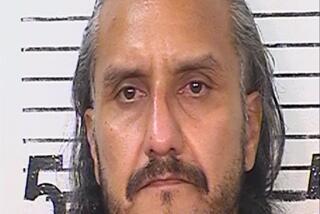Slaying Case That Became Bitter Feud for D.A. Comes to Quiet End
- Share via
Herman Martin, who pleaded guilty to manslaughter in the killing of a La Jolla lawyer after Martin’s 1982 second-degree murder conviction was overturned on grounds of prosecutors’ misconduct, was sentenced Wednesday to the four-plus years already spent in prison.
Martin, 68, a former Solana Beach insurance executive, received credit from San Diego Superior Court Judge Jesus Rodriguez for time served in prison from 1982 to 1987 and received no additional time.
The sentence made final a plea-bargain announced last November between Martin and the state attorney general’s office. The deal ended the case’s lengthy and complicated procedural history and avoided the retrial the California Supreme Court ordered in 1987 after finding that Martin’s first trial was tainted by San Diego County prosecutors’ misconduct.
Martin maintained Wednesday that he was innocent, but said he agreed to plead guilty to manslaughter in the death of La Jolla lawyer Richard Crake because a new trial would have been expensive, his wife recently died and he suffers from heart problems.
“Any shock can put me down,” he said. “I’m terminally ill. My death is imminent. I don’t want to die in a courtroom.”
But, he added, “My children, my grandchildren, my friends--they know I’m innocent.”
Martin was charged with forcing an employee in his insurance company to beat up Crake in 1981 to collect money Martin said the attorney owed him. The employee went to Crake’s home and bludgeoned the lawyer to death with a gun.
In November, 1987, Martin won a new trial when the state Supreme Court found “serious misconduct” by the prosecution.
That 1987 decision upheld the findings of a special referee appointed by the high court to investigate the case. Retired appellate Justice Gerald A. Brown concluded in a 1986 report that misconduct by Dist. Atty. Edwin Miller’s office and perjury by a key witness resulted in Martin’s wrongful conviction.
Brown’s findings had so enraged Miller that he issued press releases and made strong public statements criticizing the report.
Miller said in a 1986 interview that Brown’s analysis of the case had been a “rather naive, gullible approach.” Shortly after the 1987 Supreme Court ruling, Miller called Brown’s report “just bunk.”
Martin’s appeals lawyer, Charles M. Sevilla, then charged that Miller was so biased against Martin that Martin could not receive a fair trial if the San Diego district attorney’s office were involved.
The 4th District Court of Appeal in San Diego agreed, saying in a decision issued last June that the “district attorney’s involvement in the Martin case” had moved from “purely impartial ‘professional’ concerns to undue ‘personal’ concerns based on a desire to prove the referee’s findings wrong.”
Last October, the state Supreme Court let that decision stand without comment.
Under the plea bargain, the attorney general’s office, which took over the case, agreed to drop three additional counts against Martin--assault, conspiracy to commit extortion and conspiracy to commit assault with a deadly weapon.
Rodriguez suspended a $2,500 fine and ruled that Martin is not on parole because of the time he already had served.
More to Read
Sign up for Essential California
The most important California stories and recommendations in your inbox every morning.
You may occasionally receive promotional content from the Los Angeles Times.













